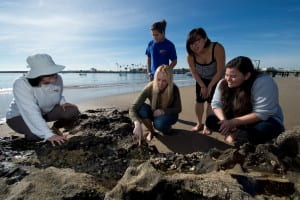Sea change
UCI oceanographer studies effects of global climate fluctuations on aquatic ecosystems

Visitors to Katherine Mackey’s office on the third floor of Croul Hall may think they’ve wandered into a secluded wing of a botanical conservatory. A small wooden desk and an upholstered sofa are among the few pieces of furniture in this room dominated by a lush canopy of plants, all looking to be in spectacular health.
“A long time ago, I wanted to be a traditional botanist; some of that has carried over,” says Mackey, the Clare Boothe Luce Assistant Professor of Earth System Science at the University of California, Irvine. “I study photosynthesis in supreme detail, but now I usually just refer to myself as an oceanographer.”
The serene setting disguises the somewhat foreboding nature of Mackey’s work. Her persistent investigations into the biology and chemistry of Earth’s oceans has made the scientist a direct witness to the unfolding effects of global climate change.
“We’re going to have to adapt,” she says. “The question is how painful it’s going to be.”
As evidence, Mackey points to the minute organisms that she finds most fascinating: marine phytoplankton. They are the base of the aquatic food chain, and while their numbers are vast, they’re quite sensitive to changes in temperature, currents and nutrient levels in the ocean. When sea surface temperatures rise as a result of global warming or El Nino, there is less upwelling of the nutrient-rich water that feeds these creatures.

Steve Zylius / UCI
Samples collected on mid-oceanic expeditions or by Mackey’s students lowering containers from the Newport Pier are brought to her lab and examined under a microscope. Mackey tinkers with individual cells and studies how they create and use proteins in an effort to understand how planetwide forces are impacting the tiniest organisms in the sea.
“Phytoplankton are the keystone,” she says. “They’re the ones taking energy from the sun and carbon out of the water, out of the air, and making stuff to eat. It’s that step that gets everything into the food web that an animal needs to build its cells.”
In a recent study, Mackey examined how plankton respond to different ratios of nitrogen and iron in mid-ocean and coastal waters when they’re forced to absorb large amounts of carbon deposited in the atmosphere by humans.
The ocean takes in carbon dioxide as part of its natural cycle, she says, “but when we start putting excess CO2 into the air, more and more of it dissolves into the surface of the ocean, and it reacts with the water to form carbonic acid.”
Ocean acidification is a major problem, Mackey notes: “It’s a global issue, it’s clear-cut, and we know it’s anthropogenic. There’s really no quibbling about it.”
Scientists have a good understanding of how human-caused acidification affects phytoplankton species such as Coccolithophores, which have calcium carbonate shells that can easily be liquified. But there’s increasing interest in acidification’s effect on a cyanobacteria strain called Synechococci, which Mackey knows well.
“There’s a huge hole, and it’s with the organism that I study,” she says. “So let’s see if we can fill that in.”
Mackey, who lives in Irvine with her two sons, came to UCI in 2014. She’s already highly regarded in the Department of Earth System Science and a key member of the UCI OCEANS research and education initiative.
“Kate brings a strong interdisciplinary approach that combines chemical and biological principles,” says Adam Martiny, director of UCI OCEANS. “By providing a new way to ask and answer questions about the ocean, Kate’s research has helped to fundamentally change basic paradigms.”
Prior to completing doctoral and master’s degrees in environmental engineering at Stanford University, Mackey earned bachelor’s degrees in botany and biological engineering at the University of Maryland. On an expedition to the Sea of Cortez between her freshman and sophomore years, she came into contact with oceanographers.
“They would tell us about upwelling and how the ocean wasn’t just this one big, homogenous bathtub, that there were different water masses, and they had different chemical properties that influenced what grew there,” she recalls. “I was mesmerized; it blew my mind.”
Mackey hopes to impart some of that enthusiasm to the graduate students she mentors and the undergrads who attend her classes. She’s developing a new course, tentatively called Aquatic Field Methods, that will train students in the techniques and best practices she employs on her marine forays.